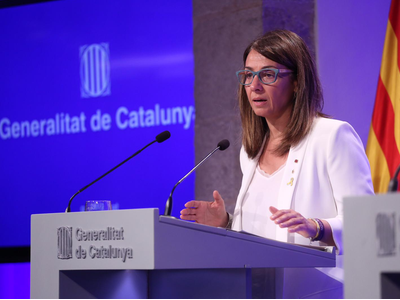- The executive has joined political institutions around the world in declaring a climate and environmental emergency with the aim of achieving the mitigation objectives set out in the Law on Climate Change

The Government of Catalonia has joined political institutions around the world in declaring a climate and environmental emergency with the aim of achieving the mitigation objectives set out in the Law on Climate Change, adopted in August 2017. The government has made a commitment to:
- adopt administrative simplification measures to eliminate any obstacles to the achievement of objectives for climate change mitigation and energy transition;
- increase incentives and prioritise policies and public resources aimed at advancing the transition to a 100% renewable, nuclear-free, zero-carbon energy model that is neutral in greenhouse gas emissions, reduces the vulnerability of the Catalan energy system, and ensures access to energy as a common good, as provided in the Law on Climate Change;
- give prioritity, in public policy, to options that have a lower climate impact and contribute more to adaptation to conditions caused by climate change;
- adopt the measures required to stop the worrying loss of biodiversity and promote recovery of ecosystems;
- identify and provide support to sectors of the economy that must undergo a transition, whether to adapt to new conditions caused by climate change or shift to activities that produce low levels of greenhouse gases (GHG), within an overarching framework that prioritises the circular economy and the creation of green jobs;
- adopt measures to reduce the vulnerability of the sectors of society most sensitive to climate change impacts and those that may be more affected by this transition;
- adopt an urban mobility model based on 1) public transport, use of shared vehicles and micro-mobility options; and 2) zero-emission vehicles;
- declare photovoltaic installations that use advanced, efficient photovoltaic systems for collecting solar energy installations of strategic territorial interest; and
- together with the Ministry of Territory and Sustainability and the Ministry of Business and Knowledge, develop a territorial strategy for deploying renewable energy installations (mainly wind and photovoltaic) as required to move forward with Catalonia’s energy transition and achieve the energy objectives set out in the Law on Climate Change.
Environmental and economic damage
As the text approved today states, the Catalan government is concerned about the impacts that climate change is having now and will have in the future, in Catalonia and around the planet, and believes it is necessary to raise awareness of the danger this phenomena represents, as the scientific community has repeatedly warned. Apart from the obvious impact on ecosystems, climate change could cause significant damage to the Catalan productive economy, ranging from negative impacts on the functioning and maintenance of many infrastructures to significant alterations to the environments in which activities such as tourism, agricultural production, and water- or energy-intensive industry activities are carried out. Health impacts are another important consideration.
According to a recent report from the Intergovernmental Panel on Climate Change (IPCC 2018) on the impacts of global warming of 1.5 °C above the pre-industrial level, we need to cut global emissions by around 45% by 2030 (from 2010 levels) and achieve zero net emissions by 2050. Furthermore, a recently published report from the Intergovernmental Science-Policy Platform on Biodiversity and Ecosystem Services (IPBES 2019) warns that nature is declining globally at rates unprecedented in human history and that the rate of species extinction is accelerating.
In Catalonia, the Third Report on Climate Change (2016) highlights the difficulties that many sectors and ecosystems will face in the coming decades in a warmer, drier climate where extreme phenomena are more frequent, and in an environment that presents a series of particular challenges – for example, water resources are already under intense pressure; there have been drastic changes in land use, the coastline has been significantly altered by human activity; agriculture is excessively focused on feeding animals, and self-sufficiency in food production is low; biodiversity is continuously being lost; renewable energies are not well developed; and urban environments often have high levels of pollution. Tackling all these challenges is vitally important for the welfare of citizens and to ensure that Catalan society remains competitive, fair and cohesive.
The Law on Climate Change: a turning point
The Law on Climate Change is a turning point and a response to the challenges Catalonia faces. The Law, passed with broad support in Parliament, includes ambitious goals such as achieving GHG neutrality and transitioning to a 100% renewable electricity production model by 2050. Implementing the Law will take determination and committed action by all actors, including civil society and economic sectors – and especially all levels of government.
With the participation of civil society and economic sectors, the Catalan government also adopted the Natural Heritage and Biodiversity Strategy of Catalonia 2030, which establishes specific objectives and indicators. Civil society is making its voice heard, demanding that governments and political institutions take clear, decisive action. A good example is Fridays for Future, an international movement of school students who are asserting their right to a future without the burden of climate change and demanding that measures be taken to make that future possible.